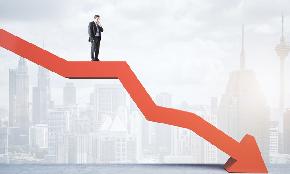At the Renaissance Mayflower Hotel a panel of experts waxed intellectual on the current state of the governmental stimulus, the real estate market and the future of the economy. Transwestern and Real Estate Forum co-sponsored the webinar, ‘Real Estate’s Perfect Storm: Institutional Investors Weather the Crisis’, which included Steve Wallace from Cornerstone Real State Advisors; Pat Duncan from USAA Real Estate; Rod Vogel from Principal Real Estate Investors; Bill Carlson from CIGNA Investment Management; Brian Lee from Northwestern Mutual; Chris McGibbin from TIAA-CREF; Cathy Marcus from Prudential Real Estate Investors; and was moderated by Steve Pumper from Transwestern and Michael Desiato from Incisive Media.
Pumper noted how “this has been a year of the pretend and extend, or as Bill [Carlson] told me a couple of weeks ago, ‘a rolling loan gathers no loss.’ And so everybody is trying to kick the can down the road and kind of push things off a little bit” until the industry starts “to see some permanence occurring within the economy.”
The government has tried its hand at stabilizing the economy, but the general consensus was that these programs were not working in the long-term. “What we have seen is a progression of different small shops, generally new groups coming through with all sorts of ideas of how we could make money taking advantage of TARP or TALF or PPIP,” Marcus explained. “And thus far, at the end of each of these meetings, we’ve all sort of come to the conclusion that they just don’t work, and that we really can’t think of any way that we could reasonably do something with any of these programs.” She noted that there were too many restrictions and “bureaucratic overlay.”
Wallace, however, made a point on the importance of the programs’ existence, despite their long-term efficacy. “There certainly was a psychological benefit to having something out there that you could [use], [an] any port in a storm kind of thing,” he said. “However, I think now that things have calmed down a bit, I think people are now focusing more on the future…” Companies that don’t need the money now, don’t have to use it, he pointed out, but companies that might need it to buttress their business have it available, if they meet the programs qualifications.
“The consumers probably led us into this, and they’re going to lead us out,” McGibbon predicted. But, he met with some disagreement from a skeptical Lee, “I’m not terribly optimistic that’s going to happen. I don’t think the consumer has any dollars left.” The numerous contradicting expert opinions, he explained, are causing a “lot of confusion” for your average consumer causing savings, as opposed to reinvestment. Lee also pointed out that commercial real estate is not in a position to be the economy’s engine, nor numerous other industries, so it might be a while before an economic savior emerges.
The panel also turned to a struggling tenant situation that has evolved from the anemic credit markets. Marcus notes the shift from landlord concerns for tenant rental payments, to the tenants now being worried about a company’s long-term viability. More well-positioned companies are finding tenants gravitating towards them in a market where a fair number of buildings are falling into default and changing owners.
Problems still persist, even for solid companies as rising unemployment plays chicken with landlords’ credit. “If you’ve got good credit on your rent roles, they may be using two-thirds of the space and whether they’ve called you yet or not probably depends on what company you’re talking to, but those calls will come,” Wallace explained. “And when those leases renew, then you’ve got the juggling act. ‘Okay, well, I don’t necessarily mind downsizing this good tenant.’ What does it leave you with? Is it something [you] can really rent, or do [you] want to roll the dice and lose the entire occupancy?”
To hear the entire webinar, click the link below: https://event.on24.com/eventRegistration/EventLobbyServlet?target=registration.jsp&eventid=155294&sessionid=1&key=BA1D93E225A23FA7F4A4338A901444D7&sourcepage=register





 Copyright © 2024 ALM Global, LLC. All Rights Reserved.
Copyright © 2024 ALM Global, LLC. All Rights Reserved.











